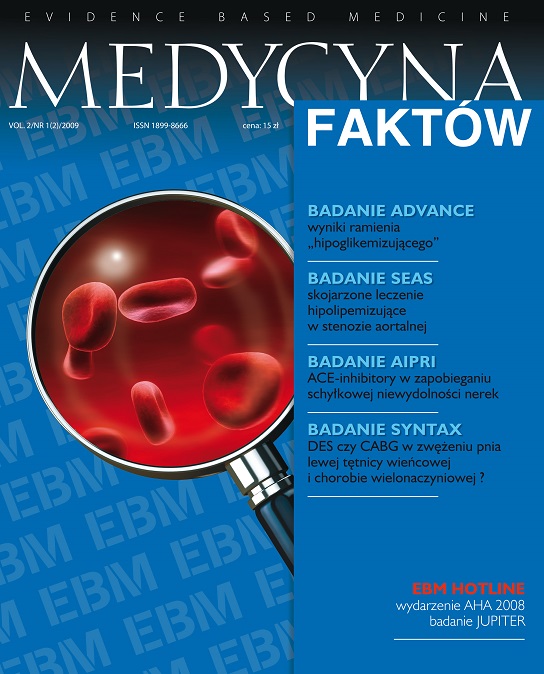Badanie ADVANCE – efekty intensywnego leczenia hipoglikemizującego w cukrzycy typu 2 Artykuł przeglądowy
##plugins.themes.bootstrap3.article.main##
Abstrakt
W pracy omówiono wyniki ramienia „hipoglikemizującego” badania ADVANCE. Celem badania była ocena wpływu intensywnej kontroli glikemii (HbA1c ≤6,5%), przy zastosowaniu gliklazydu o zmodyfikowanym uwalnianiu i ewentualnie innych leków hipoglikemizujących u chorych na cukrzycę typu 2, na rozwój mikro- i makronaczyniowych punktów końcowych. W grupie osób z intensywną kontrolą glikemii uzyskano obniżenie poziomu hemoglobiny glikowanej (HbA1c) do 6,5%, zmniejszenie względnego ryzyka występowania powikłań makro- i mikronaczyniowych o 10%, w tym nefropatii o 21%.
##plugins.themes.bootstrap3.article.details##
Jak cytować
Szelachowska, M. (2009). Badanie ADVANCE – efekty intensywnego leczenia hipoglikemizującego w cukrzycy typu 2. Medycyna Faktów , 2(1(2), 9-14. Pobrano z https://journalsmededu.pl/index.php/jebm/article/view/2676
Numer
Dział
Artykuły
Copyright © by Medical Education. All rights reserved.
Bibliografia
1. Juutilainen A., Lehto S., Rönnemaa T. et al.: Type 2 diabetes as a „coronary heart disease equivalent”. Diabetes Care 2005, 28: 2901-2907.
2. Stratton I.M., Adler A.L., Neil H.A. et al.: Association of glycaemia with macrovascular and microvascular complications of type 2 diabetes (UKPDS 35): prospective observational study. BMJ 2000; 321: 405-412.
3. Intensive blood glucose control and vascular outcomes in patients with type 2 diabetes. The ADVANCE Collaborative Group. NEJM 2008, 358: 2560-2572.
4. Zalecenia kliniczne dotyczące postępowania u chorych na cukrzycę. PTD 2008. Diabetologia Praktyczna 2008; 9 (supl. A).
5. Gaede P., Vedel P., Larsen N. et al.: Multifactorial intervention and cardiovascular disease in patients with type 2 diabetes. NEJM 2003, 348: 383-393.
6. Gaede P., Lund-Andersen H., Parking H.H., Pedersen O.: Effect of multifactorial intervention on mortality in type 2 diabetes. NEJM 2008, 358: 580-501.
7. Effects of intensive glucose lowering in type 2 diabetes. The Action to Controll Cardiovascular Risk in Diabetes Study Group. NEJM 2008, 358: 2545-2559.
8. Abraira C., Duckworth W.C., Moritz T.: Glycemic separation and risk factor control in the Veterans Affairs Diabetes Trial: an interim report. Diabetes, Obesity and Metabolism 2008; doi: 10.1111/j.
9. Ismail-Beigi F., Moghissi E.: Glycemia management and cardiovascular risk in type 2 diabetes: an evolving perspective. Endocrine Practice 2008, 14: 639-643.
10. Holman R.R., Paul S.K., Betel A. et al.: 10-year follow-up of intensive glucose control in type 2 diabetes. NEJM 2008: 359.
2. Stratton I.M., Adler A.L., Neil H.A. et al.: Association of glycaemia with macrovascular and microvascular complications of type 2 diabetes (UKPDS 35): prospective observational study. BMJ 2000; 321: 405-412.
3. Intensive blood glucose control and vascular outcomes in patients with type 2 diabetes. The ADVANCE Collaborative Group. NEJM 2008, 358: 2560-2572.
4. Zalecenia kliniczne dotyczące postępowania u chorych na cukrzycę. PTD 2008. Diabetologia Praktyczna 2008; 9 (supl. A).
5. Gaede P., Vedel P., Larsen N. et al.: Multifactorial intervention and cardiovascular disease in patients with type 2 diabetes. NEJM 2003, 348: 383-393.
6. Gaede P., Lund-Andersen H., Parking H.H., Pedersen O.: Effect of multifactorial intervention on mortality in type 2 diabetes. NEJM 2008, 358: 580-501.
7. Effects of intensive glucose lowering in type 2 diabetes. The Action to Controll Cardiovascular Risk in Diabetes Study Group. NEJM 2008, 358: 2545-2559.
8. Abraira C., Duckworth W.C., Moritz T.: Glycemic separation and risk factor control in the Veterans Affairs Diabetes Trial: an interim report. Diabetes, Obesity and Metabolism 2008; doi: 10.1111/j.
9. Ismail-Beigi F., Moghissi E.: Glycemia management and cardiovascular risk in type 2 diabetes: an evolving perspective. Endocrine Practice 2008, 14: 639-643.
10. Holman R.R., Paul S.K., Betel A. et al.: 10-year follow-up of intensive glucose control in type 2 diabetes. NEJM 2008: 359.
